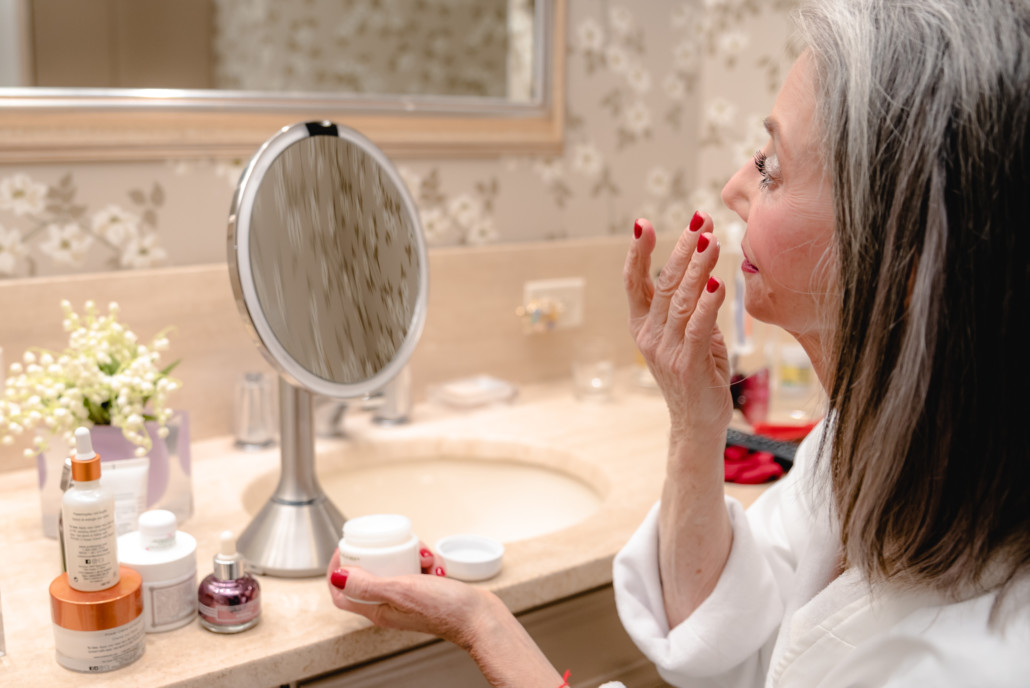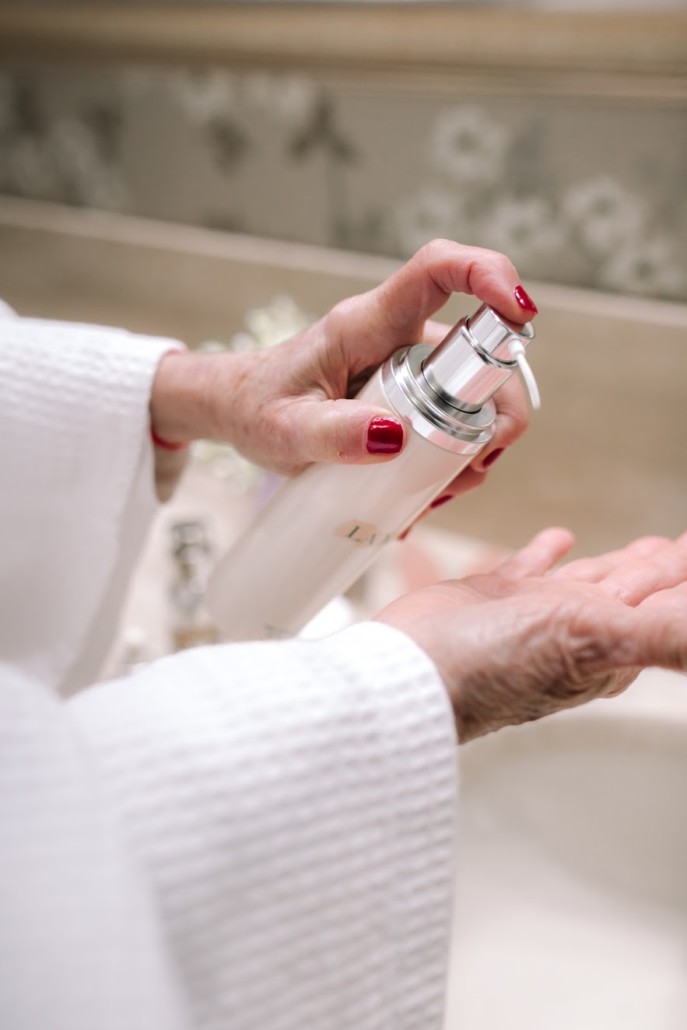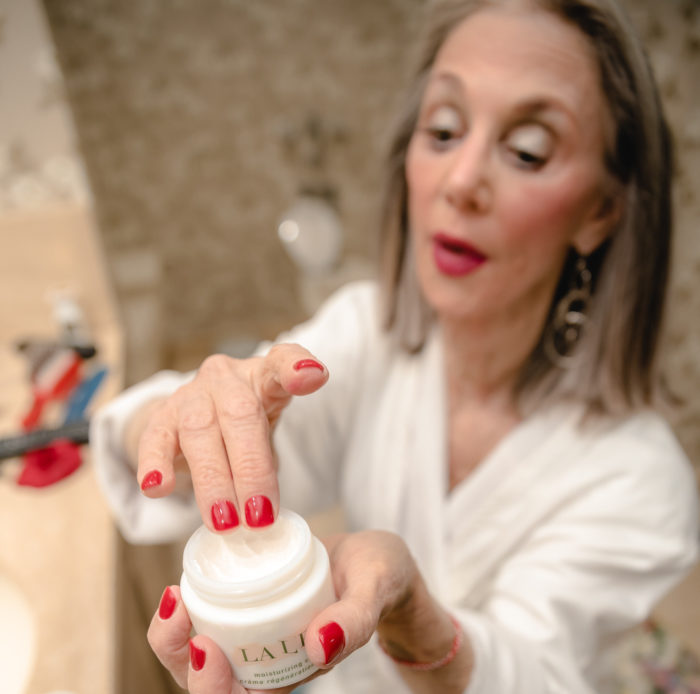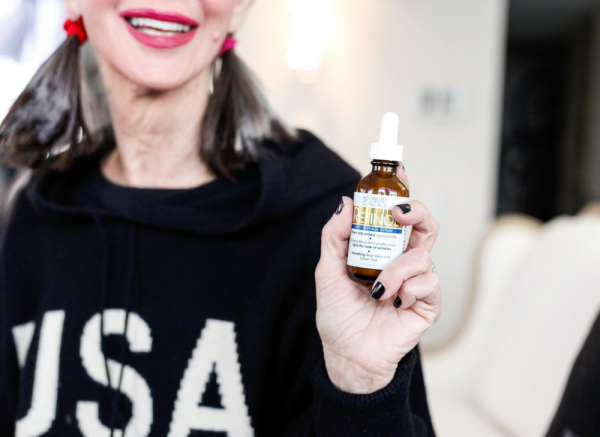Today’s post on menopausal skin and how to care for it was written by Cora Gold, Cora Gold is a skincare and beauty writer, as well as the editor at women’s lifestyle magazine, Revivalist. She knows her stuff when it comes to caring for aging skin. Enjoy, darlings!

Along with changes in your hormones that affect everything from sex drive to changes in your hair, whether you’re premenopausal, menopausal, or postmenopausal, your skin is changing, and you must make changes to how you care for it.
During menopause, your body undergoes many changes. While you go through menopause, you may be aware of the common symptoms, such as hot flashes, but there are some that you may not expect. As your hormones begin to change, you may experience changes in your skin.
You should love the skin you’re in, no matter your age. While wrinkles and fine lines are perfectly natural, it’s normal to struggle with your self-image as you age. You shouldn’t feel pressured to seek procedures to keep up with beauty standards, though. Your skin is your body’s largest organ, so you should care for it like any other part of your body.
Just like how your skin changed when you went through puberty, you may have a similar experience during menopause. You shouldn’t feel ashamed of these changes, but there are ways you can take special care. Here’s how to care for your menopausal skin so you look and feel great during this transition.
What Is Menopausal Skin?

Menopause brings many changes and doesn’t discriminate regarding your skin. During premenopause, your skin could become inflamed due to hot flashes. You could experience a rash with hives or red bumps if you have sensitive skin. Additionally, you could get acne from hormonal changes or experience slight sagging.
Your testosterone, estrogen, and progesterone levels drop drastically during menopause. Your body also stops making as much collagen, which supports your skin’s elasticity.
Not only that, but your skin will lose about 30% of its collagen during the first five years of menopause, causing a loss of firmness. Collagen loss can also increase the appearance of pores. Testosterone reduces sebaceous gland activity, which can lead to less acne. However, the dip in estrogen can make your skin more dry and prone to wrinkles. Be prepared for thinning, sagging and wrinkling skin as you navigate menopause.
In summary, you may experience these changes to your skin during menopause:
- Inflammation
- Rashes, hives, or redness
- Acne
- Loss of firmness and elasticity
- Enlarged pores
- Wrinkles and dryness
This list might sound scary, but it’s all a natural part of aging. If your skin becomes irritated or sensitive during menopause, there are plenty of natural ways you can care for it. Here are some steps you can take to alleviate menopausal skin symptoms.
How to Care for Menopausal Skin

The most important way to care for menopausal skin is to use the right products and ingredients. Your skin will likely become much more dry, so moisturizing will be essential.
Use night creams instead of daytime moisturizers to lock in moisture, and avoid cleansers with alpha hydroxy acid since it can dry out your skin. Look for ingredients like salicylic acid that can penetrate your pores and dissolve oil. Additionally, you’ll want to use a moisturizer with antioxidants like vitamins C and E to repair your skin. Ceramides are also useful ingredients in moisturizers since they keep moisture from escaping.1
Wearing sunscreen daily can help you prevent wrinkles and reduce existing ones. While wrinkles are a natural part of life, excessive sun exposure can cause bigger problems, such as skin cancer. You should apply it even when it’s cloudy outside, as the sun’s rays will still penetrate your skin. Add a layer of vitamin C before your sunscreen to help combat discoloration, reduce the appearance of brown spots and prevent new ones.
You should reassess your skin as pH levels change to determine your best skincare routine. Try various products or visit a dermatologist to create an efficient treatment plan. Avoid irritating ingredients in skin care products and detergents until you’re familiar with your newly sensitive skin.
Tips for Postmenopausal Skin

Once you’ve determined an effective skincare routine and understand how your skin changes during menopause, understand that your skin and hair will likely change a little more. Progesterone and estrogen levels drop drastically after menopause — so much that they’re sometimes undetectable. Therefore, you should continue using skin care products like retinol, peptides, and antioxidants.
Your skin quits producing hyaluronic acid–which helps boost collagen and seals in moisture–after menopause. A serum with hyaluronic acid can mimic these useful functions and help combat dry skin. Prevention is crucial to keeping your skin healthy, so monitor and maintain your skin’s changes during perimenopause and menopause to prepare you for post-menopausal skin care.
You may not be able to prevent your skin changes, but you can take actionable steps to prevent irritation and weakened skin. Staying hydrated and eating a balanced diet can improve your skin from the inside out. Eat foods rich in water, like watermelon, strawberries, skim milk, broths, and soups, to help you stay hydrated and nourish your skin.
Drink plenty of water throughout the day, and carry a refillable bottle and replenish it when it gets low. You can infuse it with fruit or cucumbers to add a hint of flavor if you find plain water too bland.
Caring for Your Skin During Menopause and Beyond
Your skin naturally undergoes many changes as you age — it comes with the territory. If you want to embrace aging gracefully, there’s no need to fight against it through procedures or heavy makeup. Instead, nurture your skin through a healthy lifestyle and the right skincare techniques. The most important thing is to love yourself and your skin as you age gracefully.
Sources:
- https://www.rejuvenationclinicofsaukprairie.com/blog/skin-rejuvenation-101/

Author bio: Cora Gold is a skincare and beauty writer, as well as the editor at women’s lifestyle magazine, Revivalist. Connect with Cora on LinkedIn, Twitter, and Pinterest.
Have you found any special tips or tricks to care for your menopausal or post-menopausal skin? I’d love for you to share in the comments.
If you enjoyed this story, please subscribe to my email list. When I post a new story, you will receive it in your inbox.
+ show Comments
- Hide Comments
add a comment